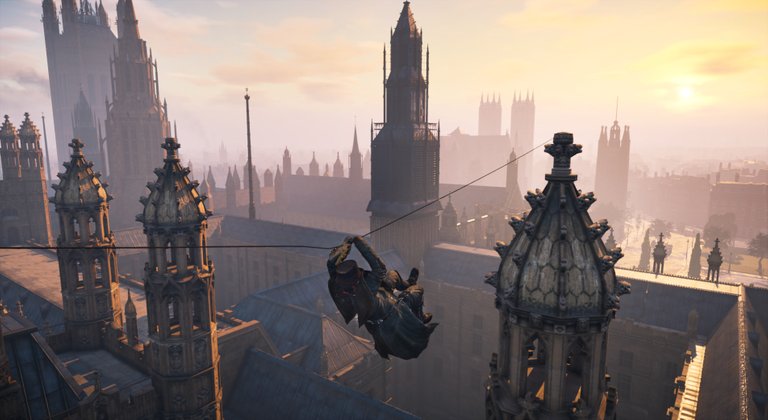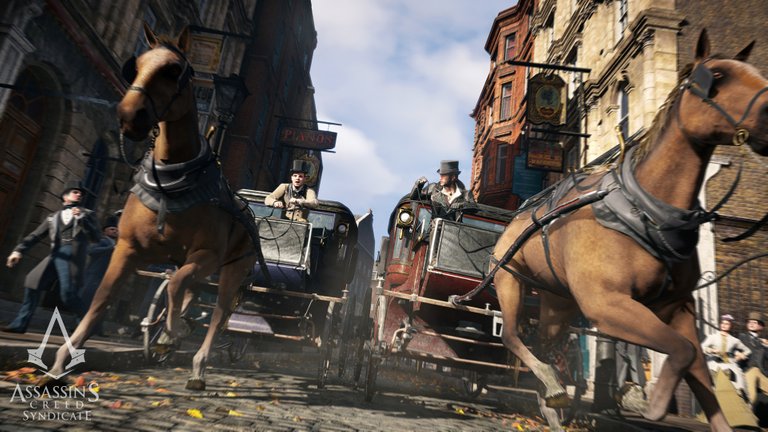Assassin's Creed Unity
Despite the success of Black Flag, Unity takes another left turn for the franchise. In some ways, it goes all the way back to the Ezio era, dropping the vast open worlds for more detailed urban environments. Unity was the first next-gen game for the series, designed to push boundaries of what's possible with the newly released Xbox One and PlayStation 4 consoles.

Unity was a huge leap forward in terms of graphical fidelity. The recreation of Paris was simply sublime, with far more detail than was possible with the best of the Ezio trilogy like Florence, Rome or Constantinople. At the time, it was pretty much the best looking game out there, featuring some of the first implementations of modern tech like global illumination or ambient occlusion. But where Unity knocked it out of the park was with crowd simulation. It successfully added it as a gameplay feature. Indeed, to this very day at the very end of this generation, no game has surpassed Unity's crowd simulation.
Unfortunately, they were overambitious. Unity is a result from the split into 3 teams after Revelations, so they had started work on this game way back in 2011. For whatever reason, they vastly overestimated the next-gen console's CPU performance, and it was too late to halt the train. As a result, Unity had horrible performance on the consoles, and even brought high-end PCs down to their knees. The game was a stutterfest, often dropping down to the 20s and rarely keeping at 30 fps.
In addition to struggles with tech, and perhaps even as a consequence of it, the game was a step back in terms of gameplay and mission design. The narrative certainly was interesting, but overall, Unity never delivered on its ambitions.
Unity's team was disbanded, and now there remained only two teams working on Assassin's Creed - one at Ubisoft Montreal, and a dedicated new studio at Ubisoft Quebec.
Assassin's Creed Syndicate
Ubisoft Quebec's first project was to fix Unity's issues. And they did just that... with a graphical downgrade. Gone were the incredible crowd simulations, the realistic lighting, etc. The Assassin's Creed games have always been known to be at the cutting edge of graphics tech, so it was quite a surprise to see the first instalment in the series featuring graphics worse than its predecessor.
It shouldn't have been surprising, though, as this was the right decision. Syndicate ran smoothly on consoles and much better on PCs too. It was now maintaining a pretty smooth 30 fps, and as a result, felt much better to play.

Syndicate was very much a follow-up to Unity, using many of the same concepts. It improved on some of the repetitive aspects of Unity, but at the same time, failed to innovate. Victorian London wasn't quite as marvellous as French Revolution Paris, but it was a great setting nonetheless. The writing was also top notch, with delightful characters, though the overall plot was fairly thin, even if well written.
Ultimately, while Syndicate addressed many of its issues, it also suffered from many of its questionable decisions. Fatigue had well and truly set in by now, and I had pretty much given up on the franchise. I would still keep playing Assassin's Creed games, but it was no longer an exciting place of innovation that it used to be. Luckily, I was wrong, as we'll find out in the final part of this series.

Ubisoft realised this too, and went about soft-rebooting the franchise. There were now only two teams, as mentioned before. The team that made Black Flag - the last great AC game - set out to execute this reboot, while Ubisoft Quebec expanded to take a 180 degree turn from Syndicate.
Very good job once again @liberosist i realy enjoing reading your Gaming posts !!!
Thanks!